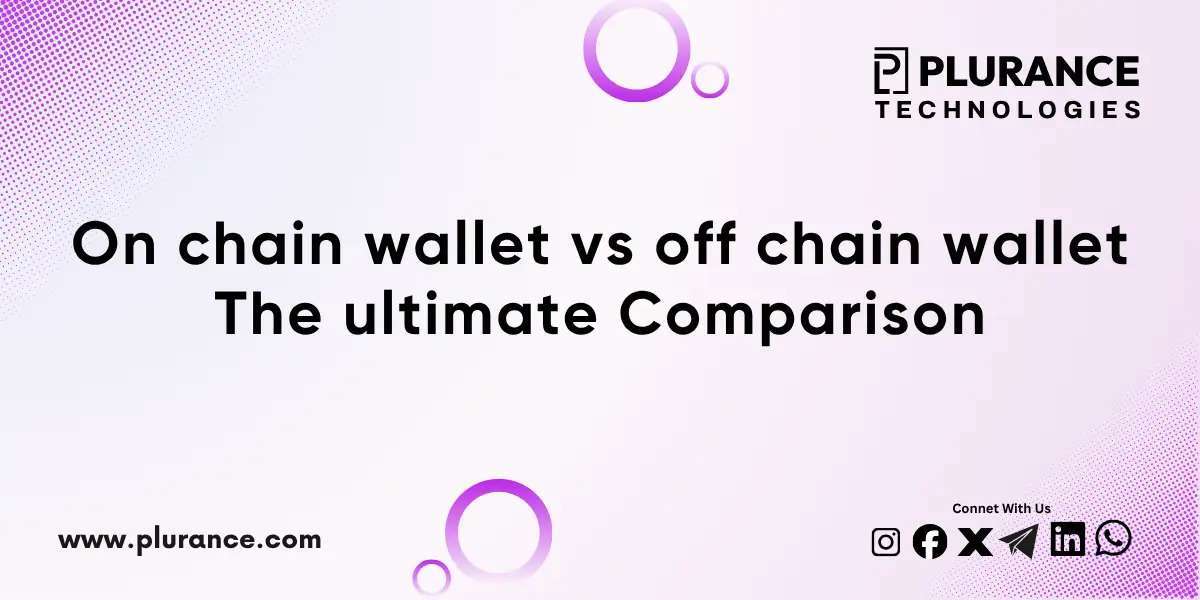On-chain vs Off-chain Crypto Wallet is a fundamental difference that defines how digital assets are created, managed, and traded. On-chain tokenization fuses asset data right on public blockchains, thereby empowering instant settlement, openness, and worldwide accessibility. Meanwhile, off-chain tokenization retains the complete asset data with the external storage and leaves only references on-chain. This way, it is easier to control the assets and reduce the costs. This is the result of phenomenal institutional demand for real-world assets.
This blog provides a deep understanding of both the designs by comparing their features and benefits to guide the user in making the right choice between off-chain and on-chain crypto wallet.
What Are Crypto Wallets and Why Do They Matter?
Crypto wallets are the software designed to enable users to store, send and receive digital currencies like Bitcoin, Ethereum or altcoins. Actually, they are not the storage of the tokens; at the same time, they have the private keys proving ownership on the blockchain.
Wallets can be described in general as:
· Hot wallets (online, connected to the internet).
· Cold wallets (offline, for more security).
The distinction between on-chain and off-chain is deeper, describing what transactions and data have been changed concerning the blockchain network. On-chain wallets mean the one that directly communicates with the blockchain whereas off-chain wallets are those that are on secondary layers or use outside systems for convenience.
By opting for an unsuitable wallet, you might find yourself vulnerable to security risks, expensive fees, and slow transactions. As the crypto market is predicted to have an exponential growth (the worldwide tokenization market could hit $13.5 billion by 2030), the right decision is more than ever necessary.
What Are On-Chain/Off-Chain Crypto Wallets and Why Are They Important?
On-Chain Crypto Wallets
On-Chain Wallets are wallets that are on the blockchain network. They store users’ private keys and to perform transactions, they interact with the blockchain directly. These wallets give users full control over their funds, thus providing them with accountability and safety. On-chain wallets are best suited for the users who are security and decentralization are their top priorities as they do not require to trust any third party.
Off-Chain Crypto Wallets
Contrary to On-chain wallets, Off-Chain Wallets function outside the blockchain network. To carry out transactions off-chain, they use payment channels or sidechains as facilitating technologies. Off-chain wallets are more advantageous as they provide lower fees and quicker transactions compared to on-chain wallets. Besides, they can be the right choice for those who put efficiency and scalability in the first place as they are suitable for conducting frequent transactions or micropayments.
On-chain vs Off-chain crypto wallets: Key differences
Aspect | On-chain wallets | Off-chain wallets |
Transaction speed | Slower (minutes to hours) | Faster (near-instant) |
Privacy | Lower (public ledger) | Higher (less on-chain exposure) |
Cost | Higher fee due to network congestion | Lower or no fees |
Scalability | Limited by Blockchain capacity | High, via Layer-2 or sidechains |
Security | high(immutable, decentralized ) | Good, but relies on trusted layers |
Use Case | Long-term holding, Defi | Daily transactions, micropayments |
Control | Full user sovereignty | Some trust in intermediaries |
DeFi/DApp Integration | Integrate effortlessly into DeFi protocols and DApps.
| To fully utilize DeFi capability, limited or indirect access must be bridged to the main chain. |
Decentralization | Private keys are fully decentralized, with no intermediaries; the user controls them.. | Partially centralized, often involves trusted third parties or sidechain operators. |
How to Choose Between On-Chain and Off-Chain Wallets?
Selecting the right wallet is largely based your crypto habits as well as the items that matter most to you:
Assess Your Needs: If you are a trader who is very active and you need to be able to transact very quickly, it is better to use the off-chain method. On the other hand, if you are the kind of person who has a large number of coins and you want to store them securely for a long time, the on-chain method would be better.
Security Priorities: Use on-chain to opt for decentralization and maintain control if that is what you value most. Off-chain may be used for the sake of convenience; however, it is always wise to combine it with hardware to have extra security.
Frequency of Use: Those who use the service a lot will find that it is much faster if they go off-chain; however, those users who access the system only from time to time will probably prefer on-chain.
Asset Types: Make sure that there is compatibility between on-chain and off-chain for diversified tokens. The latter is for tokens belonging to specific networks such as Bitcoin's Lightning.
User Experience: Newcomers might find off-chain more convenient due to its simplicity, but on-chain would be more suitable for mature users considering its diversity.
Though multi-signature support and regular updates are the top priorities for a wallet to be considered as secure, the most important thing is to always have it in your mind. Use both types for different purposes and don't put all your eggs in one basket.
Benefits of Using On-Chain and Off-Chain Wallets
Benefits of On-Chain Wallets
Enhanced Security and Decentralization: Every node in the network validates a transaction; hence the system is less intermediary-dependent; there are much fewer possibilities for having a to-hack single point of failure.
Full Transparency and Auditability: Public blockchains keep an indiscriminate record of every transaction ever made so that anyone interested may check the ownership or history of an asset at any time through explorers such as Etherscan.
Immutable Records: After confirmation, transactions become unchangeable; hence they are tamper-proof evidence of ownership and also fraud are reduced.
Seamless DeFi and DApp Integration: On-chain operations allow users to easily connect to the decentralized finance (DeFi) ecosystem, stake, mint NFTs, and utilize smart contracts without going through intermediaries.
Complete User Control: Your Public/Private Key Pair belongs to you and is the reason why Crypto is the Self-Custody solution thereby eliminating the risk of Custodian interruptions.
Global Accessibility: 24/7 trades and transfers without any restrictions of location, great for cross-border investments.
Long-Term Holding Suitability: It is a safe way out for HODLers, offline (cold) storage like hardware wallet gives full security to large crypto holdings from online attackers.
Benefits of Off-Chain Wallets
Superior Speed and Scalability: The transactions are carried out without any delay on layer-2 networks or sidechains; thus, they can handle a large number of transactions, which, in turn, results in no congestion of the blockchain.
Cost Efficiency: To keep the fees to an absolute minimum (which are often less than $0.01 per transaction) the settlements are batched so that the high gas costs during peak network times are avoided.
Improved Privacy: The details of the transfer are not immediately entered onto the public ledger, thus maintaining privacy for the transfers in the eyes of casual observers.
User-Friendly for Frequent Use: Simplified interfaces and mobile optimisation will be more apt for daily kinds of micropayments/tradings or beginner users who want to avoid technical complexity.
High Throughput for Microtransactions: The network has been designed to allow many very fast, low-value transfers and, therefore, can be put to use across a range of real-life applications such as payments and gaming.
Hybrid Flexibility: Usually, it is designed in such a way that it works with on-chain for the final settlements so as to provide the speed together with the security afforded by the underlying blockchain.
Reduced Network Load: It takes the routine activity that is off the main chain, thus, it helps the overall blockchain ecosystem to be more sustainable and have a lower environmental impact.
Top On-Chain and Off-Chain Crypto Wallet Solutions to Try in 2026
Top On-Chain Wallet Solutions
These prioritize direct blockchain interaction for security and DeFi.
· MyEtherWallet (MEW)
· Trezor Safe 3
· MetaMask
· Phantom
· Exodus
· Ledger Nano S
Top Off-Chain Wallet Solutions
· Zengo
· Trust Wallet
· BlueWallet
· Bitget Wallet
· Zap
· Binance Smart Chain Wallets








